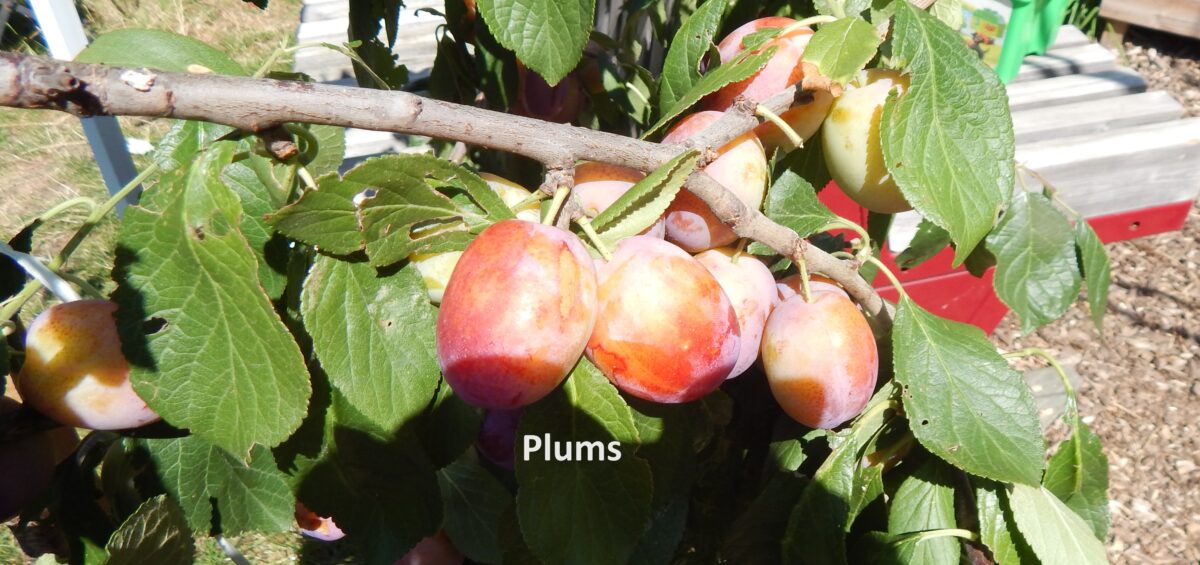I am a volunteer in the community garden today. My shift runs from 10 am to 12.30. There’s always two of us on at any time. That’s a safety thing, we haven’t had much trouble, a difficulty person occasionally, but back up is more comfortable. It’s warm and windy, but when the sun goes in the clouds it suddenly chills. Warm and windy is what my mother would call ‘good drying weather.’ Great for a washing line of clothing but bad for our garden, especially since it has been dry most of the week.
I spend much of my time giving the garden a hose down, now that we have a hose. It’s not the best time to water, but it isn’t that hot, so better than not watering, as the forecast is high temperatures tomorrow and on Monday, even in the 30s. I finish off by filling the cascade of barrels at the back of the mid stage. That’s the easiest place to water from with a watering can, as the high temperatures mean we are going to be watering in any way we can.
Much of our summer flowering has faded, but a few hollyhocks hang on. The globe thistles are still a little blue, the sun helping but they are past their best. There’s a morning glory in the Fothergill bed, one of those flowers that keep going, but nothing beats the marigolds. Some plants are much more affected by drought than others. Like lychnis which wilts so easily, catch it in time with a watering can and it will recover, but leave it too long and you have a dead plant. We have a good crop of plums, greenish yellow with a touch of red, and the grapes are slowly ripening on the small pergola with at least a month to go.
I am asked what to do about snails and slugs by a visitor. He tells me he has used slug pellets, but they have come back again. I tell him, we don’t use slug pellets in the garden; they are bad for birds and pets. And sure, snails will come back from other gardens as soon as you stop laying pellets. I tell him, he can go out at night when they come for a feed, and collect them. I don’t tell him what to then, as I am a little squeamish. I know people who drop them in a bucket of water and drown them, or who tread on them, who hit them with a hammer. This is the fascist element in gardening, with weeds killed in any and every way, hoed and with chemicals, and snails trodden on. Fortunately, the community garden doesn’t use chemicals, and we let snails live. They munch our hollyhocks and love acanthus which they strip the stem, though it keeps flowering somehow.
The man asks me about black spot on roses. I say, pick off the leaves and burn them, and hope that works. I look it up when the man has gone. Black spot is a virus and there are chemicals you can use, but not by us.
A woman comes in and asks, do we want a barbecue, one of those half barrel types. The garden is trying to be green, in the eco-sense, and barbecues don’t fit with this. Much of the charcoal used comes from dubious sources, forests that shouldn’t be cut down. And carbon dioxide is created firstly in making charcoal and then again in its burning in the barbecue. So I am hesitant, then I consider, we could use the barbecue as a planter, so I take an executive decision and say yes. At least, it won’t be going to landfill. I hope others agree. If the worse comes to the worse, we can leave it outside the garden for someone to take away, but I hope we use it as a planter.
While I am writing my notes for this blog, a mouse darts across, so speedily, as if there is a falcon about to dart down and gather it up, and disappears under a planter. Sensible mouse, with the garden cat stalking about. It’s not our cat, but comes from a few doors up, and treats the garden like its own patch. We are happy to see it.
Next Sunday, 18 August, 1.00 – 3.30 pm, we have our commemoration of Benjamin Zepheniah, the dub poet, actor, novelist, playwright and writer for children, who sadly died last November. He lived in the borough for over 20 years and would go running in the early hours over Wanstead Flats. A permanent display has been made and will be unveiled. There will be West Indian food, Newham Bookshop will be selling some of Benjamin’s books, and there will be tributes from those of us who knew him.

